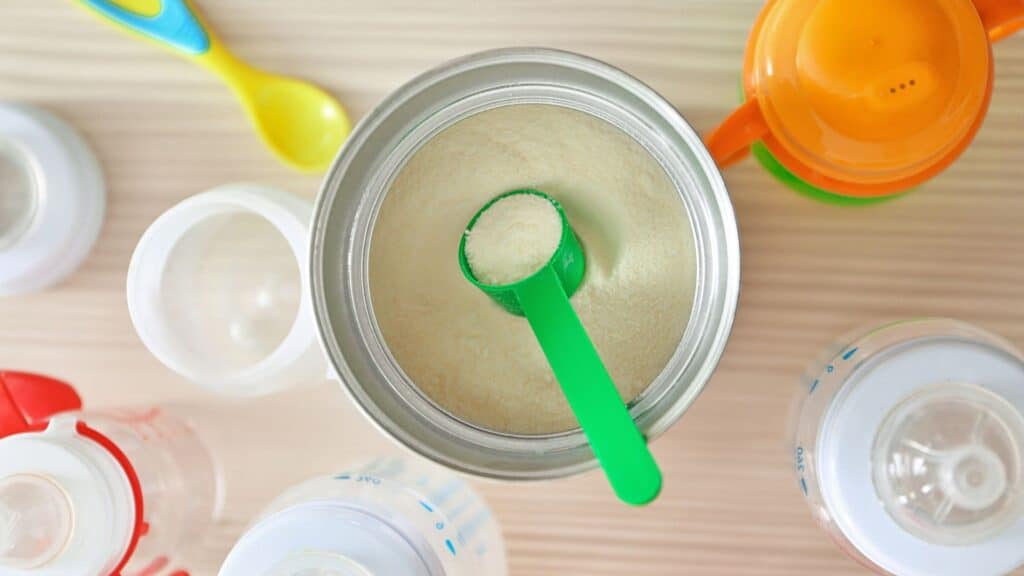During the first year, addressing baby formula and gas is crucial for a baby’s physical, cognitive, and emotional development, ensuring their overall health and comfort.However, bottle-fed babies can suffer from gas, causing discomfort for both the baby and the parents. To alleviate this, parents must choose the right formula, containing gentle proteins and carbohydrates, and feed the baby correctly to prevent them from swallowing air. If the baby still experiences discomfort, frequent burping and gentle tummy massages can help. Under a pediatrician’s guidance, you may also use over-the-counter baby gas relief drops.
In this blog, we’ll explore the causes of infant gas and offer advice on choosing high-quality formulas to minimize discomfort and ensure your little one’s healthy development.

Gas-Related Problems in Babies
If you have a gassy baby, you know how challenging it can be to soothe them and keep them comfortable. Gas bubbles in your baby’s digestive tract can cause tummy troubles and discomfort, making it difficult for them to settle down and sleep. Breastfed babies may experience less gas than bottle-fed babies, as they are less likely to swallow too much air during feeding.
It is tricky, yes, but fret not, the common gas symptoms list below will help you spot when it is time to take action!
1. Colic
Colic is a condition that can leave parents feeling helpless and exhausted as they try to comfort their baby through episodes of intense, inconsolable crying that can last for hours. The baby may feel pain and discomfort from colic in their belly, making them writhe in pain even without crying. Colic typically begins within the first few weeks after birth and can last for several months, usually resolving itself by the time the baby is three to four months old.
2. Gassiness
Gassy babies can be a handful to deal with, as the discomfort caused by air bubbles in their stomach and intestines can lead to fussiness, bloating, and general irritability. Babies tend to swallow more air when they eat or cry, which can create more gas bubbles in their digestive system. Many parents can prevent gas by holding their baby upright during feedings and ensuring a proper seal around the bottle or nipple to reduce air intake.
3. Constipation
Constipation can cause painful pressure in a young baby’s belly and lead to gas and discomfort. Parents who are bottle-feeding can try adjusting the formula, while also making sure to burp their baby frequently during feedings. Tummy time can also help stimulate the digestive system and encourage regular bowel movements. If your baby continues to struggle with constipation, it’s important to speak with a pediatrician to rule out any underlying digestive and kidney diseases.
4. Acid Reflux
Acid reflux is a common condition in babies and occurs when the stomach contents flow back up into the esophagus. This can cause discomfort, fussiness, and spitting up. Food sensitivities or certain foods in the baby’s diet may contribute to acid reflux. Keeping the baby upright for a few minutes after a feeding can also help reduce symptoms. If you suspect your baby has acid reflux, it’s important to speak with a pediatrician to determine the best course of action. gas drops
5. Lactose Intolerance
Some babies are lactose intolerant, which means they cannot digest lactose, a sugar found in milk. This can cause gas, bloating, and discomfort.
6. Food Allergies
Lactose intolerance is a common digestive problem among infants, where they are unable to digest lactose, a natural sugar present in milk or formula. Consumption of dairy products or certain foods that contain lactose can cause discomfort, gas, and bloating in lactose-intolerant babies. Common allergens include cow’s milk, soy, wheat, and eggs. In such cases, switching to lactose-free infant formula or consulting a pediatrician for appropriate dietary recommendations can help alleviate these symptoms.

Types of Baby Formulas
There are a lot of baby formulas out there, some of the most common types of baby formulas are:
Cow’s Milk-Based Formula
Cow’s milk-based formula is a common choice for parents who want their baby to be able to drink cow’s milk. Manufacturers pasteurize cow’s milk and then dry it into powder form to make this type of formula.
Cow’s milk-based formulas are available in both regular and soy varieties.
The main problem with cow’s milk-based formulas is that they don’t have the right balance of nutrients for infants to develop properly.
If you choose this kind of formula, you must supplement it with other foods such as vegetables and fruits, so your baby gets all the minerals and vitamins she needs.
Soy-Based Formula
Soy-based formulas are a good option for babies who are allergic to cow’s milk. Parents who wish to avoid animal products or accustom their baby to the taste of soy also favor them.
Soy-based formulas contain more protein than other types of formulas, and they can help protect against allergies and asthma. But they don’t contain as much iron as some other formulas, so it’s best to use them only as an occasional substitute for breast milk or full-term formula.
Hydrolyzed Formula
Hydrolyzed formula, designed for easy digestion, contains proteins broken down into tiny pieces. This makes the formula easier to digest and absorb.
Hydrolyzed formulas are often used for babies who have trouble digesting regular or cows’ milk formulas. They can also be used if your baby has colic or food allergies.
Amino Acid-Based Formula
Amino acid-based formulas are made with high-protein, low-carbohydrate ingredients. They’re great for babies who are having trouble with their digestion, or who have been born prematurely.
These formulas are also ideal for babies that are allergic to cow’s milk, soy, and other common protein sources.
Combination Formula
Most parents choose combination formulas as the best option for their babies. These formulas blend cow’s milk and soy to make digestion easier for the baby compared to other formula types. They also contain added vitamins, minerals, and other nutrients that your baby needs.

Gas-Reducing Formulas
Gas-reducing formulas are a great way to help your baby feel more comfortable when they’re fussy. These formulas are designed to help reduce gas, which can cause a lot of discomfort for your little one.
Similac Total Comfort
Similac Total Comfort is one of the most popular gas-reducing formulas for babies. It contains three types of prebiotics and two types of probiotics to help support your baby’s digestive health. It also contains LactoPrebiotic, which is a blend of galacto-oligosaccharides and fructooligosaccharides designed to help reduce unwanted gas.
The lactose content in Similac Total Comfort has been reduced from 20% to 12%, making it easier to digest. The formula also contains additional vitamins and minerals, such as vitamin C and iron, which helps support your baby’s immune system and help them grow strong bones.
Similac Total Comfort comes in powder form, so you can mix it with water or breast milk easily at home or on the go.
Enfamil Gentlease
Enfamil Gentlease is a formula that has been specifically designed to help your baby’s tummy feel better after eating. It’s made with an ingredient called Betaine HCl, which is a form of hydrochloric acid.
This acid is produced by the stomach to help break down food, but sometimes babies don’t produce enough acid on their own. Enfamil Gentlease helps with that problem by supplying more of the acid your baby needs.
The formula also contains fructooligosaccharides (FOS), which are prebiotic fibers that help promote healthy gut bacteria growth. FOS is found in breast milk and can help promote proper digestion and intestinal health in formula-fed babies.
Gerber Good Start Soothe
Gerber Good Start Soothe was designed to help your baby’s digestive system adjust to the solid foods they’re eating. It’s a gas-reducing formula that contains prebiotics and probiotics, which help promote healthy bacteria in your baby’s gut.
Gerber Good Start Soothe is a great option for babies with colic, gas, or both. It has been shown to reduce colic-related crying by up to 70% in a clinical study.
Nutramigen
Nutramigen is a popular, effective formula for babies who are sensitive to milk proteins. It’s designed to help reduce the amount of gas a baby has after drinking milk by breaking down other proteins in their stomachs. This formula can be used for babies who are allergic to cow’s milk or have had a problem with colic or constipation.

Tips to Reduce Gassiness in Infants
While there is no clear link between a breastfeeding mother’s diet helping decrease a baby’s discomfort from gas, some foods may trigger gas in some infants. If your baby is experiencing excessive gas, there are several things you can try to alleviate the discomfort.
Here are some tips to reduce gassiness in infants:
Burp Your Baby Frequently:
Burping your baby frequently after feeding is a great way to reduce the risk of gassiness. It helps prevent the trapped air in their stomachs from causing gas and discomfort. The best time to burp your baby is right after a feeding, but you can also help them burp at any other time if they seem uncomfortable.
Use the Right Feeding Position
It’s important to realize that every baby has different preferences when it comes to how they want to feed. Some babies want to look at their mom as they are eating, while other babies want to look away. Some like feeding lying down on their backs, while others want a propped-up sitting or kneeling position.
Slow Down Feedings
One of the biggest problems that can cause gassiness in infants is fast feeding. When you work to slow down the pace at which your child is eating, it can help reduce gas and make them feel more comfortable.

Check the Nipple Size
When choosing a nipple size, choose the one with a shape that seems most similar to your child’s lips. If possible, get help from a lactation consultant who has experience with breastfeeding infants.
Switch to a Different Formula
If your baby is fussy and gassy on one formula and not the other, try switching formulas to see if that helps. Infant formulas today are very different in their ingredients, so even though you may have used one before without an issue, it still makes sense to shop around.
Massage Your Baby’s Tummy
Massage your baby’s tummy, legs, and back to help relax the muscles and reduce stress. Give your baby a gentle massage for about five minutes to help relax the bowels and ease discomfort.
Use Gas Relief Drops
If your baby is gassy and crying, use gas relief drops. Put a few drops on their pacifier or bottle nipple and the taste will soothe the gassiness.
Consider Probiotics
Probiotics may help improve your baby’s digestion and reduce gas. Talk to your pediatrician about whether probiotics may be right for your baby.
It’s important to remember that some degree of gassiness is normal in babies, and it typically resolves on its own as their digestive system matures. However, if your baby seems particularly uncomfortable or is not gaining weight appropriately, be sure to consult your pediatrician.

Takeaway
In conclusion, choosing the right formula for your baby is an important decision that can impact their development and comfort.
It is important to understand the types of formulas available and factors that affect gas production, such as lactose intolerance, cow’s milk protein sensitivity, formula preparation and storage, and infant feeding habits.
While gas is common in infants, excessive gas can cause discomfort, fussiness, and sleep disturbances. Parents should consult with their pediatrician to determine the best course of action to help their baby digest food properly and reduce gas.
A healthy, balanced diet and proper feeding techniques can help ensure a happy, comfortable baby during this critical developmental period.
If you have any questions, please leave a comment below and I will reply as soon as possible.



